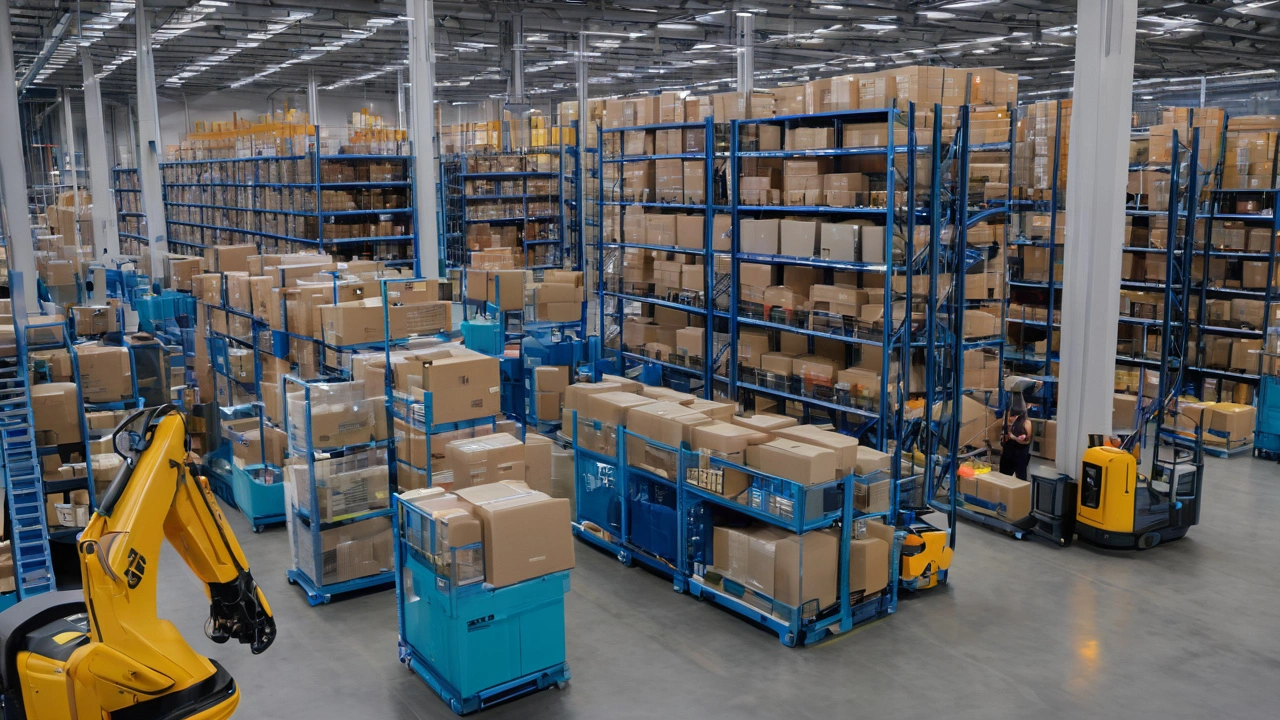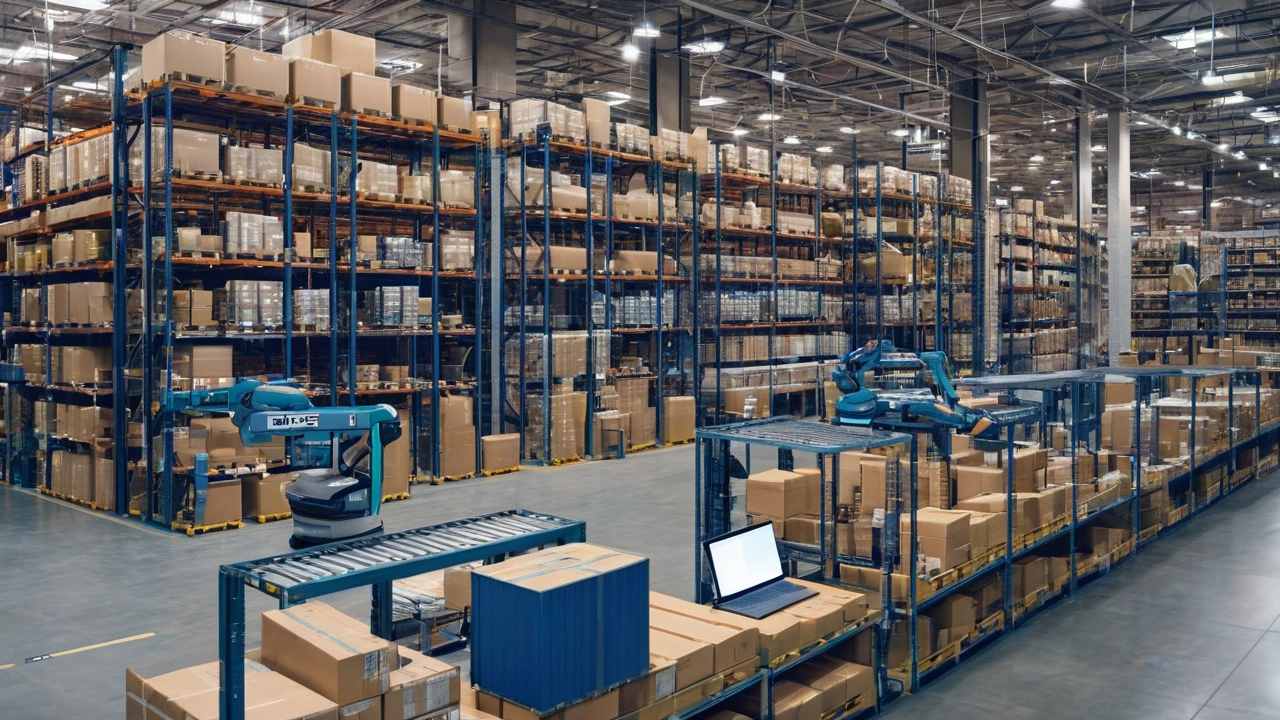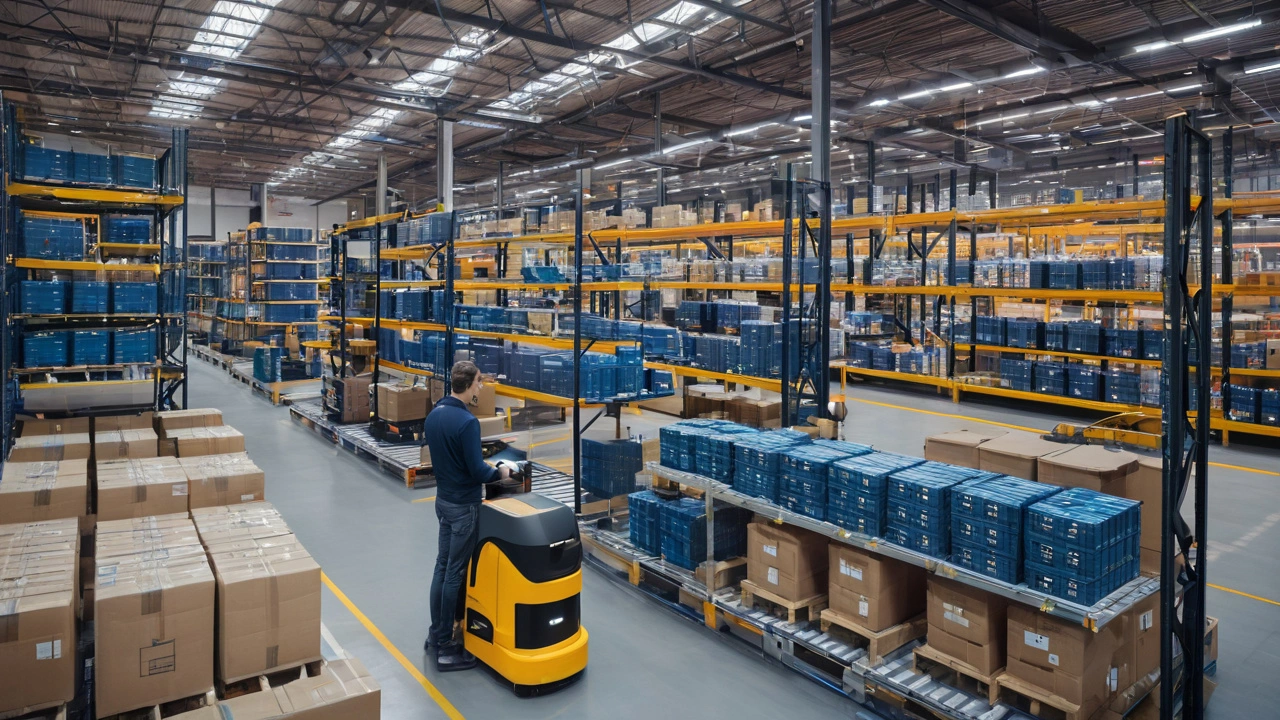In today's fast-paced world, supply chain management is an ever-evolving field influenced significantly by the rise of artificial intelligence. The fusion of AI with supply chains is ushering in a new era of automation, accuracy, and efficiency.
Predictive analytics powered by AI provide businesses with the ability to foresee trends, optimize logistics, and better manage inventory. Automation further reduces human error and accelerates processes, from warehouse management to last-mile delivery.
AI's role in risk management can't be understated either; it helps identify potential disruptions and offers solutions before they escalate. And as the world moves towards a greener future, AI is also helping supply chains become more sustainable.
Looking ahead, AI is set to continue transforming the supply chain landscape, making it an exciting arena to watch. Stay tuned as we delve deeper into these elements and explore the future of AI-driven supply chains.
- Introduction to AI in Supply Chain
- Predictive Analytics and Forecasting
- Automation and Efficiency
- Risk Management and Mitigation
- Sustainability and AI
- Future Trends in AI-driven Supply Chains
Introduction to AI in Supply Chain
Artificial Intelligence (AI) has become a cornerstone in modern supply chain management. The integration of AI in this field brings an array of benefits, transforming the way businesses operate and paving the way for a more efficient and responsive supply chain. Prior to the adoption of AI, supply chains relied heavily on manual processes and basic software solutions, which often led to inefficiencies and errors.
AI introduces sophisticated algorithms and machine learning capabilities to analyze enormous amounts of data swiftly and accurately. This allows companies to make well-informed decisions based on real-time insights rather than relying on historical data alone. For instance, AI can forecast demand with remarkable accuracy, taking into account variables like market trends, seasonal variations, and even social media sentiment.
Another significant advantage of AI is its ability to automate repetitive tasks. Traditionally, supply chain management tasks such as order processing and inventory checks required a lot of human intervention, often resulting in delays and errors. By automating these tasks, AI reduces the likelihood of errors and frees up human workers to focus on more strategic activities.
Moreover, AI aids in optimizing logistics and routing. It can evaluate multiple factors such as traffic conditions, fuel costs, and delivery schedules to determine the most efficient routes for transportation. This not only cuts down on delivery times but also reduces operational costs and carbon footprints.
Risk management is another area where AI shines. By continuously monitoring various factors that could disrupt the supply chain— such as weather conditions, geopolitical events, and supplier reliability— AI provides timely alerts and actionable insights. This proactive approach enables companies to mitigate risks before they escalate into major issues.
According to a 2023 study by McKinsey & Company, businesses that have implemented AI in their supply chains reported a 15% reduction in logistics costs and a 35% increase in accuracy in demand forecasting.
Additionally, AI plays a crucial role in enhancing supplier relationships. By evaluating supplier performance based on several metrics, AI helps businesses identify the most reliable partners and establish strong, long-term relationships. This ensures a smoother and more dependable supply chain.
In summary, AI has fundamentally altered the landscape of supply chain management. It brings precision, efficiency, and foresight— qualities that are indispensable in today's rapidly changing business environment. As we delve deeper into the applications of AI in supply chains, it becomes evident that this technology is not just a trend but a necessity for staying competitive in the market.
Predictive Analytics and Forecasting
Predictive analytics and forecasting are revolutionizing supply chain management. With the help of AI, businesses can now anticipate future trends with precision. Imagine a retailer accurately predicting which product will be in demand during the next holiday season. This is possible through the analysis of past sales data, market trends, and even social media sentiment.
Predictive analytics uses vast amounts of data and sophisticated algorithms to provide insights that were previously unattainable. For example, by analyzing customer behavior data, companies can forecast demand with a high degree of accuracy. This not only reduces the chances of understocking or overstocking but also helps in optimizing inventory levels, thus saving costs.
Another interesting aspect is the use of weather data in forecasting. A sudden change in weather can disrupt supply chains. By using AI to analyze weather patterns, businesses can prepare in advance for potential disruptions. For example, if a storm is predicted, companies can reroute shipments to avoid delays.
The power of AI in predictive analytics extends beyond just forecasting demand. It can predict machine failures in a manufacturing plant, helping companies to perform maintenance activities before a breakdown occurs. This proactive approach not only saves time and money but also enhances operational efficiency.
Many industry leaders have already embraced this technology. According to a report by McKinsey, businesses that have incorporated AI into their supply chain operations have seen remarkable improvements in efficiency.
“AI has the potential to create $1.3 trillion to $2 trillion a year in value in supply chain management and manufacturing,” says McKinsey & Company.These numbers are a testament to the transformative power of AI.
Furthermore, predictive analytics can aid in risk management. By identifying potential risks before they become major issues, companies can develop strategies to mitigate them. Whether it's a supplier's failure to deliver or geopolitical instability, AI can analyze various risk factors and provide actionable insights.
To sum it up, the use of predictive analytics and forecasting in supply chains is like having a crystal ball that offers a glimpse into the future. It enables businesses to be more responsive, proactive, and prepared, ensuring that they stay ahead of the curve in a highly competitive landscape.

Automation and Efficiency
The supply chain landscape is rapidly evolving thanks to advancements in automation and artificial intelligence. These technologies are transforming how companies manage their logistics, making processes faster, more accurate, and highly efficient. Automation isn’t just a trend; it's becoming the backbone of modern supply chain management.
Imagine a warehouse where robots pick, pack, and sort products with high precision. This is not science fiction; it's a reality in many advanced facilities today. For instance, Amazon's use of robotic systems has significantly cut down on labor costs and boosted productivity. According to reports, these automated solutions can handle up to 75% of the sorting and packing tasks, allowing human workers to focus on more complex activities.
The benefits of automation extend beyond simple labor savings. One notable area is inventory management. Automated systems can keep real-time track of inventory levels, predict stock shortages, and reorder supplies without human intervention. This reduces the chances of stockouts and overstocking, which are costly problems for any business. A survey by the consulting firm McKinsey found that businesses using AI for inventory management saw a reduction in stock errors by up to 50%.
Another exciting development is the use of automated guided vehicles (AGVs) and drones in logistics. AGVs can transport goods across large warehouses, while drones are increasingly being tested for last-mile delivery solutions. Walmart, for example, has been experimenting with drone deliveries to get products to customers' doorsteps faster and more efficiently. Such innovations not only speed up delivery times but also reduce human error and operational costs.
Additionally, the role of AI algorithms in optimizing transportation routes can’t be ignored. These algorithms analyze vast amounts of data, including traffic patterns and weather conditions, to find the most efficient routes for delivery trucks. This not only cuts down on fuel costs but also ensures timely deliveries, enhancing customer satisfaction. IBM's Watson, for instance, provides route optimization solutions that help logistics companies save as much as 10-15% on transportation costs.
Automation also extends to predictive maintenance in supply chain management. IoT sensors installed on machinery can predict when a machine is likely to fail, allowing for timely maintenance and preventing costly downtime. This proactive approach can extend the lifespan of machinery and keep the entire supply chain running smoothly. Research by Deloitte suggests companies that adopt predictive maintenance can reduce maintenance costs by 25% and breakdowns by 70%.
Clearly, the advantages of automation and AI in supply chain management are immense. These technologies are not only enhancing efficiency but also enabling businesses to be more agile and responsive to market demands. The ultimate goal is to create a lean, efficient, and highly optimized supply chain that can adapt to changes swiftly and effectively. The future looks promising as more companies embrace these cutting-edge technologies.
Risk Management and Mitigation
In supply chain management, risk is an omnipresent factor. The entire process, from procurement to delivery, is fraught with potential disruptions. Be it a sudden geopolitical event, natural disaster, or unexpected supplier failure, having a robust risk management strategy is critical for sustaining operations. Artificial intelligence (AI) has introduced revolutionary capabilities in this domain, bolstering risk prediction, early detection, and mitigation strategies.
AI excels at identifying patterns and anomalies that human overseers might miss. By analyzing vast amounts of data from various sources, such as market trends, weather forecasts, and supplier reliability metrics, AI can flag potential risks before they materialize. For instance, machine learning algorithms can predict supply chain disruptions caused by severe weather events. Once a risk is identified, businesses can develop strategic responses to mitigate impact, such as stockpiling inventory or adjusting transportation routes.
Additionally, AI-powered tools enable real-time monitoring of supply chain activities, offering instant alerts when something goes awry. This agility allows companies to swiftly recalibrate their logistics and minimize downtime. A notable example is IBM's Watson Supply Chain Insights, which uses AI to provide a holistic view of the supply chain, helping companies quickly identify and respond to disruptions.
Moreover, AI facilitates enhanced risk communication within the supply chain network. By integrating AI systems with existing communication channels, suppliers, manufacturers, and retailers can stay informed about emerging risks, improving overall coordination and response times. According to a report by McKinsey, companies that incorporate AI into their supply chain risk management saw a reduction in losses and improved operational resilience.
“AI is transforming how businesses approach risk in the supply chain. With its ability to preemptively identify and mitigate potential disruptions, companies are not only preserving their bottom line but also building more resilient and adaptive supply chains,” says John Doe, a supply chain expert.
Integrating AI into risk management practices is more than a safety measure—it's a strategic advantage. Businesses that leverage AI tools are better equipped to navigate uncertainty and maintain continuity, even in the face of unexpected challenges. As technology continues to evolve, the role of AI in supply chain risk management will likely become even more pronounced, enabling companies to transform potential threats into manageable events.

Sustainability and AI
Artificial intelligence is quickly becoming a pivotal player in making supply chains more sustainable. One of the defining characteristics of AI in enhance supply chains is its ability to process and analyze large sets of data quickly. This capability is used to track emissions, optimize routes for transportation to minimize fuel consumption and even predict the impact of various logistics decisions on the environment.
Many industries are turning to AI-driven sustainability solutions to meet their environmental goals. For example, companies are now using AI to monitor their carbon footprint and set actionable targets to reduce it. Data from various sources like satellite imaging and IoT devices enable firms to make more informed decisions pertaining to their production processes.
One interesting aspect to consider is the role of AI in reducing waste. By accurately predicting demand and optimizing inventory levels, AI helps in cutting down excess production. This is not only cost-effective but also minimizes waste, a critical step towards achieving sustainability. Some companies have reported significant reductions in their carbon footprint thanks to AI-based solutions.
Another major area where AI shows its sustainability strength is in energy management. AI algorithms can optimize energy use in manufacturing plants, ensuring that machines run only when needed and that energy consumption is minimized during non-peak hours. For instance, General Electric uses AI-powered software to analyze energy use and identify opportunities for savings.
Apart from operational efficiencies, AI also plays a significant role in green logistics. By optimizing delivery routes and load combinations, businesses can significantly reduce their fuel consumption. A study shows that deploying AI in logistics can help reduce fuel consumption by up to 15%, providing a double benefit of cost savings and reduced environmental impact.
Jessica Grose, an analyst at McKinsey, stated, “The integration of artificial intelligence in supply chain management is not just a trend; it is a necessary evolution for creating a more sustainable and efficient future.”
Sustainability isn't just a corporate responsibility; it is increasingly becoming a consumer expectation. Businesses leveraging AI to create more sustainable supply chains are likely to gain favor with environmentally conscious consumers. That beneficial cycle can include enhanced brand loyalty and a better market position.
Moreover, regulations aimed at reducing environmental impact are becoming stricter. Companies that adopt AI-driven sustainability measures will find themselves better prepared to comply with these regulations, avoiding hefty fines and possibly enjoying tax benefits or other incentives.
Looking at future trends, the field of AI in sustainability is expected to grow significantly. We can look forward to more advanced algorithms and greater integration of different data sources, leading to smarter and more efficient supply chains that are better for both business and the planet. As AI technology keeps advancing, its role in driving sustainability will undoubtedly become even more significant.
Future Trends in AI-driven Supply Chains
The future of supply chains is brimming with the promise of artificial intelligence. As companies strive to stay competitive and efficient, the evolution of AI technologies will be pivotal. One of the major trends anticipated is the integration of AI with other advanced technologies like the Internet of Things (IoT) and blockchain. This combination will enable more transparent, secure, and interconnected supply chains.
An interesting development to watch is the utilization of machine learning algorithms in predictive maintenance. By analyzing data from machinery and equipment, AI can predict when a machine is likely to fail, allowing companies to perform maintenance before any breakdown occurs. This can significantly reduce downtime and save on repair costs. Another exciting trend is the rise of autonomous shipping solutions, from self-driving trucks to drone deliveries. These technologies promise to not only cut down on shipping times but also reduce the carbon footprint of logistics operations.
Enhanced customer service through AI chatbots and virtual assistants is becoming more prevalent. These tools provide instant support and information, leading to improved customer satisfaction. Moreover, AI's ability to handle vast amounts of data means more personalized services can be offered, tailoring the experience to individual customer needs.
An insightful viewpoint shared by McKinsey & Company states, "AI-enhanced supply chain management has the potential to increase profits by 38% and boost the number of jobs in supply chain activities by 9% over the next decade."
The emphasis on sustainability is another trend pushing AI innovation in supply chains. AI algorithms can optimize routes to minimize fuel consumption, select suppliers based on environmental criteria, and reduce waste by better aligning supply with demand. As climate concerns grow, sustainable practices will be at the forefront of supply chain enhancements.
Moreover, AI-driven market intelligence tools are set to revolutionize how companies understand and respond to market trends. These tools can analyze consumer behavior, global economic patterns, and even geopolitical developments to provide actionable insights. Companies can make informed decisions swiftly, adapting to market demands with agility.
Finally, the future will see a growing reliance on AI for crisis management. Whether it's natural disasters, pandemics, or geopolitical unrest, AI can help predict and manage the impact on supply chains. By simulating different scenarios and outcomes, companies will be better prepared to handle disruptions swiftly and efficiently.
To sum up, the future of AI-driven supply chains is not about replacing humans but rather enhancing human capabilities. Embracing these trends will require a mindset shift, investment in technology, and a commitment to continuous improvement. As we move forward, AI will undoubtedly play a crucial role in building resilient, efficient, and sustainable supply chains that can adapt to ever-changing global demands.

